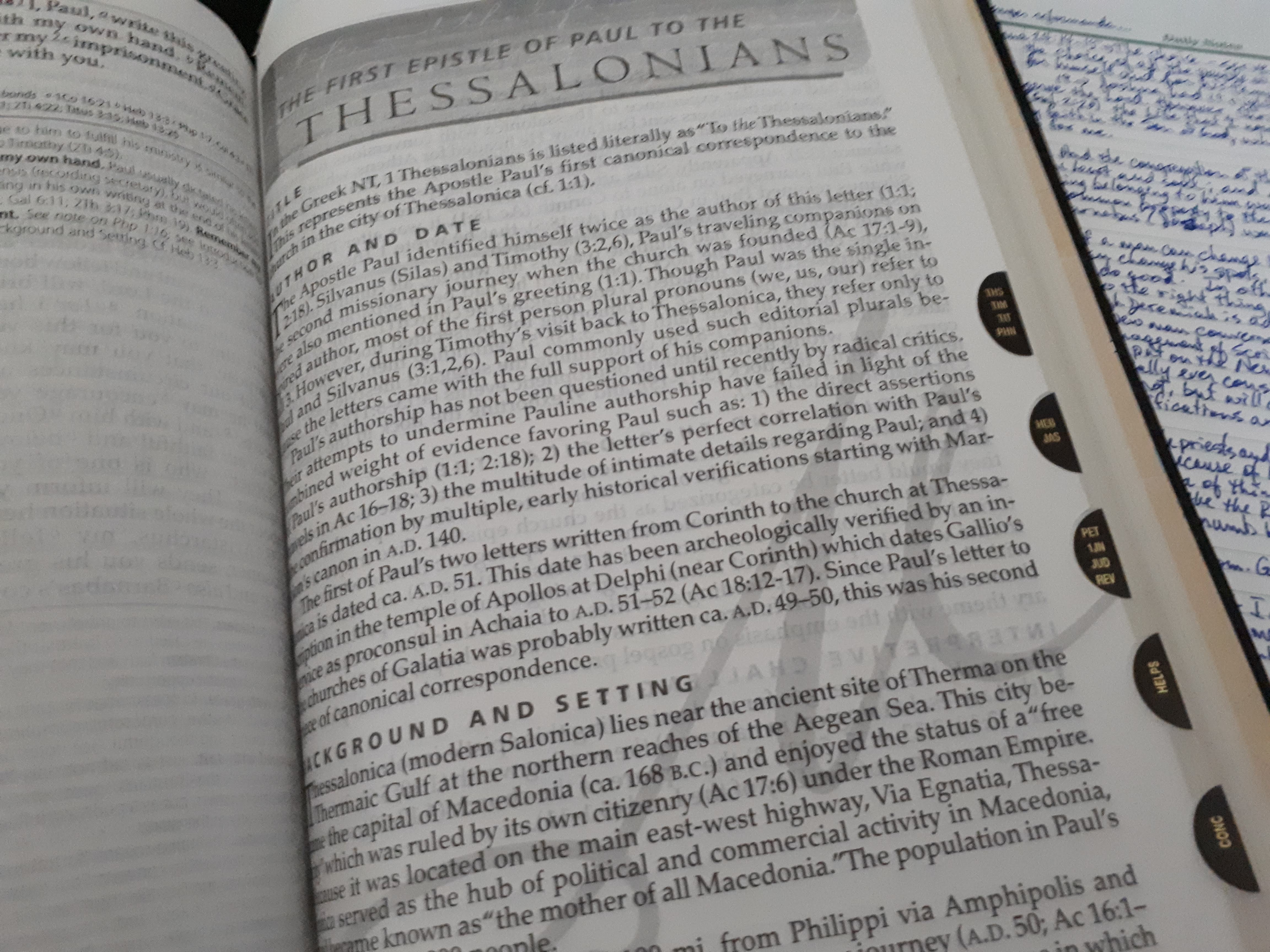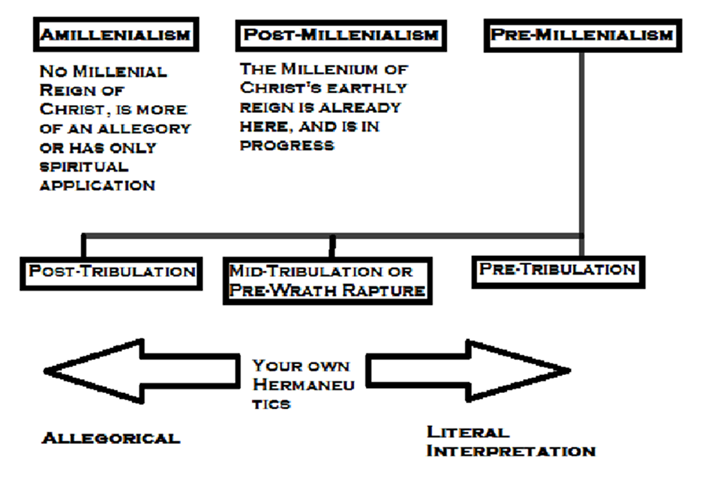1 Thessalonians 2

Just before we get into the chapter today, I should tell you that there are things in this book that people are of differing opinion about. I can only tell you what I am persuaded of, and I can’t even always tell you why, but it comes down to something called hermeneutics, the science of interpreting the Scriptures. I once saw a diagram that can give you a sense of how hermeneutics will affect your understanding of the Bible presented by the late Dr. Chuck Missler. It looks like this:

The further you are to the right of the diagram, the more literal your interpretation of the Bible. There are a few schools of thought on this, and none of them agree on just what this book is saying. I feel that I owe it to you to declare my bias at the beginning. I’m more to the right of this diagram. I am in the pre-millenial camp, and I admit to being undecided about pre- or some version of mid-tribulation harpazo event (we’ll get to that in this book). I’m not asking you to agree with me. As always, I’m asking you to do your own intellectual work and draw your own conclusions. What I say here will be my own conclusions from such activities. Ready?
Then let’s dive in to chapter 2.
1: For you yourselves know, brethren, that our coming to you was not in vain,
- The context here is from 1:9. The “entrance” is the literal “entrance” that the Paul and the others had to the Thessalonians, and that is the word “coming,” which is the same Greek word, eisodos, an entrance.
- Paul is pointing out something that the Thessalonians already knew – that entrance was not in vain [kenos, empty]. They knew there was purpose to it, and that God had reasons.
2: but after we had already suffered and been mistreated in Philippi, as you know, we had the boldness in our God to speak to you the gospel of God amid much opposition.
- You know, we tell people how hard it is to go out and preach the Gospel to others. Paul knew. In fact, this was the journey where He and Silas were beat with rods and put in jail for the night, resulting in the salvation of the jailer and his household. That is what is in the rearview mirror for Paul and Silas in Corinth here. And yet, they could still speak the word of God with boldness – and in the face of opponents not wanting them to speak. It’s no different today.
3: For our exhortation does not come from error or impurity or by way of deceit;
- Paul begins to state his case. Our exhortation [paraklesis, a calling to one’s aid, encouragement, comfort; interesting point, this is what Jesus called the Holy Spirit in John 14:26, and says that the Father will send Him on Jesus’ behalf] does not come from error [planee, a wandering], or impurity [akatharsia, uncleanness; remember, this is a negative of katharsia, a releasing or purging of negativity], or by way of deceit [dolos, bait]. So Paul was not wandering from what is accurate, he is not speaking from negativity that would poison his own soul, and he is not laying out bait for a trap.
4: but just as we have been approved by God to be entrusted with the gospel, so we speak, not as pleasing men, but God who examines our hearts.
- Approved [dokimazo, analyzed and approved] by God to be entrusted [pisteuo, to entrust, or one who will be reliable with the persuasion or opinion] with the gospel, so we speak [laleo, from lalos – talkative, meaning to proclaim continually], not as man-pleasers, but as onew\s who please God. Why? He is the one that examines [dokimazo!!!] our hearts!
5: For we never came with flattering speech, as you know, nor with a pretext for greed—God is witness—
- Paul continuing his reasoning, never came with flattering speech [kolakeia logos], nor a pretext [prophasis, pretense] for greed [pleonexia, coveteousness]. Paul is saying that he wasn’t using anything but plain language folks. In fact, a direct implication of what he says here is that those who ARE using words that are easy to listen to probably want something from you. On that list, it can be money, loyalty, you to carry their load so they can relax and look good…or like that, the direct meaning of covetousness. And then he says, God is witness, as if to say, “hey, don’t take my word for it, check with my boss!”
6: nor did we seek glory from men, either from you or from others, even though as apostles of Christ we might have asserted our authority.
- He continues his reasoning. We did not seek glory [doxa, praise, honour, approval, majesty] from men. This is a great way to check your own attitude in service, by the way, are you serving God, or doing it because the praise and recognition you get make you feel good?
- Either from you or from others. Paul is saying that he wasn’t asking anybody to agree with him. You either did or did not. It’s like he was saying others’ opinions of him really didn’t matter to him. That’s an important concept in the work of God. Especially for me – I was an abused child, and one of the first things you learn is how to do things to please people to lessen your own discomfort or pain. I was also a bullied kid, and I learned to make people laugh either at or with me (and there was a lot of both). The only opinion as a Christian that you need to worry about is that of Christ Jesus.
- Apostles of Christ. As far as church hierarchy goes, an actual apostle (and Paul was not just referring to himself here. From the direct context, Silas and Timothy were being referred to as apostles. Does that mean they exist today? I don’t know, maybe, but I haven’t seen any of the attesting miracles that accompany them for real. The Greek word apostol simply means a messenger with a specific mission. Today, we call them church planters typically, and there really seems to be no need for the position of apostle anymore, because we have the complete word of God, referred to in 1 Cor. 13 as “that which is perfect,” and listing off some things that will no longer be required.) is due some recognition and respect for his job description if he is carrying it out (and like I said, I have yet to see one for real today). That’s what Paul means here. Apostles should have some authority in the church.
7: But we proved to be gentle among you, as a nursing mother tenderly cares for her own children.
- Now here is how you can display Godliness. Instead of demanding your deserved authority, be gentle instead. What reflects God? How about Christ-like gentleness? The tenderness of a mother warmly cradling a baby to keep it safe and warm. Not thundering out of statements against this or that. The problem with beating the sheep like that is that no one actually sees God or Jesus in it – but they would in the gentle behaviour.
8: Having so fond an affection for you, we were well-pleased to impart to you not only the gospel of God but also our own lives, because you had become very dear to us.
- Paul expresses how much care and Christ-like love he had for them in this statement. He said that they loved the Thessalonians so much, that not only did they share the Gospel of Jesus Christ with them, but their own “souls” literally, meaning all they were in person in terms of experience and knowledge of God.
9: For you recall, brethren, our labor and hardship, how working night and day so as not to be a burden to any of you, we proclaimed to you the gospel of God.
- Now here is what I have said before. Remember our study in Philippians when I talked about how the saints at Philippi were one of the rare gatherings that Paul would accept financial support from? Here is the other end of this. Paul was a tent-maker, and chose rather to make the preaching of the Word of God free for the saints there and support himself in his trade rather than dip into the collection plate.
- I actually used to hold that this was the only way it should actually be – what is today referred to as bi-vocational ministry, where a person pastors a church, but he holds down a job to support himself also. I have nothing but respect for men who do this. Is this the only way? No, that was some “brain-damaged” theology that I picked up along the way – remember, Paul actually DID accept help from Philippi. He also said things like “the labourer is worthy of his hire” and even talked about not “muzzling the ox” while threshing, both statements made in relation to paid ministers.
10: You are witnesses, and so is God, how devoutly and uprightly and blamelessly we behaved toward you believers;
- Paul is saying something like, “You saw our lifestyle and conduct and heard our words when we were there with you – and so did God – and we were devout [hosios, holy, pious], we were upright [dikaios, righteous, just, doing as one ought to do], and we were blameless [amemptos, without blame] in our behaviour toward you who had believed [and as a personal observation I will add and likely toward everyone else as well].
11: just as you know how we were exhorting and encouraging and imploring each one of you as a father would his own children,
- You know, it took a long time for me to understand this. How is a father supposed to be with his own children? Well, Paul gives a good lesson in adulting here. First, we can exhort [parakaleo, to call to one’s aid! Jesus calls the Holy Spirit the Paraklete in John 14:26, if you’ll recall; We can come to the aid or come alongside our kids.] We can also encourage [paramutheomai, encourager that is alongside, literally. Like a coach, a cheerleader, a comfortor when required.] And we can implore [marturomai, to summon as a witness, or to affirm; sometimes it involves discipline, but not always.]
- As much of a lesson as there is in how a father should treat his children, this is even more instructional for the Christian worker, because that is how we are supposed to treat everybody! And why?
12: so that you would walk in a manner worthy of the God who calls you into His own kingdom and glory.
- And there it is! “Walk worthy.” This seems to be Paul’s central message at times. It is why he does what he does! From the context of the previous verse, he is doing it so that the Thessalonians would walk in a manner worthy of the God who calls us into His own kingdom and glory.
13: For this reason we also constantly thank God that when you received the word of God which you heard from us, you accepted it not as the word of men, but for what it really is, the word of God, which also performs its work in you who believe.
- Paul was constantly thankful for the Thessalonians receiving the Gospel for what it is – not vain human philosophy or sophistry, but as the very Word of God, and that Word also performs a work – sanctification – in those who believe.
14: For you, brethren, became imitators of the churches of God in Christ Jesus that are in Judea, for you also endured the same sufferings at the hands of your own countrymen, even as they did from the Jews,
- There is the repeating pattern we have seen in every place Paul went thus far – the saints in Thessalonica became imitators of the churches of God in Judea.
- This involved suffering persecution from the Jews who did not believe, just like it did in Judea. Why? Well, Jesus warned us all – they hate Me, they will hate you. This is just more of that.
15: who both killed the Lord Jesus and the prophets, and drove us out. They are not pleasing to God, but hostile to all men,
- Paul continues to explain. These unbelieving Jews were the murderers of Jesus, and of all the prophets before Jesus, and they drove out the followers of these, as they always do. And who is it that gives us the most trouble as Christians? Is it not the religious people that are better described as churchians instead of Christians? I know I’ve encountered my share of them.
16: hindering us from speaking to the Gentiles so that they may be saved; with the result that they always fill up the measure of their sins. But wrath has come upon them to the utmost.
- And what do these religious people do? Well, they interfere in our outreaches, they tell people lies about what Jesus said and what good Christians should actually be doing, they try to and sometimes succeed in enacting laws that will shut us down publicly, etc. Paul says that these individuals have already had wrath come upon them “to the uttermost.” So, maximum wrath. That should make you shudder like it does me.
17: But we, brethren, having been taken away from you for a short while—in person, not in spirit—were all the more eager with great desire to see your face.
- Paul and the brothers here were actually driven out of the region by the previously described unbelieving Jews, who were the initial source of the persecution that they suffered.
- Paul is describing something I’m not sure how to explain – but it is something I have experienced – that though we are separated as brothers and sisters in Christ geographically, we still have in us that love that He places in our hearts for one another, and it makes us long to see each other when we are separated. I have friends that I have known for many years that I always love to see when we get together, and I always miss when we are apart.
18: For we wanted to come to you—I, Paul, more than once—and yet Satan hindered us.
- And sometimes, things don’t work out. Why is that? Well, we do have opposition that is allowed to interfere from time to time, although his efforts are limited by God, and his interference always serves God’s purposes, and not the enemy’s.
19 & 20: For who is our hope or joy or crown of exultation? Is it not even you, in the presence of our Lord Jesus at His coming? For you are our glory and joy.
- Paul’s closeness to the Thessalonians is a direct result of their acceptance of the Gospel that he has been talking about all through this chapter. He says in verse 20, “For you are our glory and joy.”
Now that’s chapter 2. I know it is a little shorter than we are used to here, but hey, that’s just a straightforward chapter, and there isn’t anything in it that we have not read before in other books.
So next week, we’ll handle chapter 3, and it will be here, as a friend of mine once quipped, “same bat time, same bat channel.”







